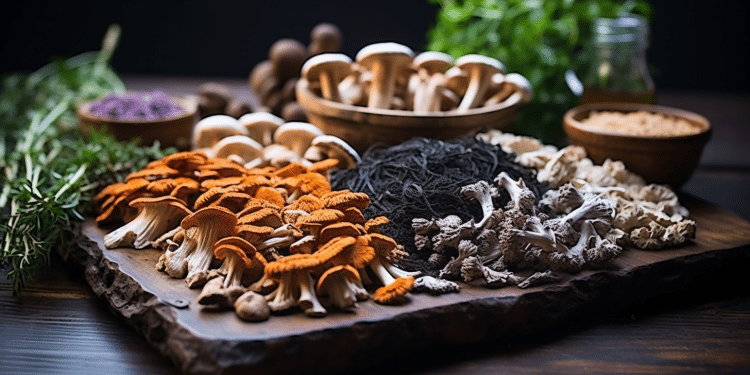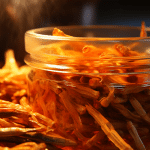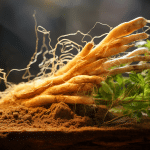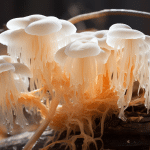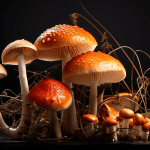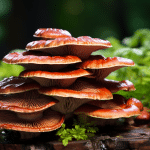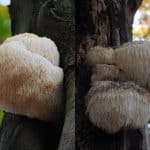The 8 Best Mushrooms for Autoimmune Disease
The following are the top eight mushrooms know for their benefits against different auto-immune diseases. The majority of these mushrooms may not cure an auto-immune disease, but they can help improve the function of one’s immune system in such a way that help relieve symptoms of different auto-immune diseases. As always, you should consult with your doctor before adding any one of these mushrooms to your diet or supplementation routine.
1. Chaga (Inonotus obliquus)
Chaga mushrooms, also called birch mushrooms, are a brown-black, dark-brown mushroom most commonly found growing on birch trees. Several compounds found in chaga can lead to its health benefits, including polyphenols, an anti-oxidant, and betulins and betulinic acid, both of which are linked with anti-cancer and anti-inflammatory effects.
2. Cordyceps (Ophiocordyceps sinensis)
Though acting more like a parasite than a mushroom, the Cordyceps is a rare, caterpillar-like mushroom found only in the high-altitude regions of Sikkim, a state in north-eastern India. The bioactive components of cordyceps include polysaccharides, cordycepins, and cordycepic acid.
An eight-week trial on healthy Korean subjects found that consuming cordyceps extract was associated with increased natural killer immune cells (NK-cell) activity. This change was accompanied by improved immune regulation, which could help with auto-immune disease, relative to controls.
Learn more: Best mushrooms for gut health
3. Lion’s Mane (Hericium erinaceus)
Hericium erinaceus is often known as the Lions Mane Mushroom because of its fur-like, white appearance. Animal models suggest lions mane can contribute to the beneficial growth of the intestinal microbiota, and is associated with reduced tissue damage to the colon in cases of inflammatory bowel disease (IBD). Researchers have suggested that lions mane could help modulate the immune system and improve health of individuals suffering from IBD, however, clinical trials are needed to validate this in humans. But modulating of the immune system could help with auto-immune disease.
4. Maitake (Grifola frondosa)
Maitake is a medicinally useful food and mushroom which has shown cancer-fighting effects in studies in animals against breast, melanoma, and hepatoma cells. Proteoglucan, the component in Maitake, has been linked to the mushrooms immune-boosting effects. In mouse models, proteoglucan has been shown to reduce mammary cancer cell behavior. In addition, polysaccharides found in maitake in both in vitro and animal studies have been shown to have antiviral activities against Hepatitis B and the human immunodeficiency virus (HIV).
Learn more: Best mushrooms for dogs
5. Oyster (Pleurotus)
Oyster mushrooms are a genus of mushrooms which includes different species like Pleurotus ostreatus and Pleurotus florida.
In vitro studies found polysaccharides found in P. ostreatus mushrooms can activate NK cells to attack lung and breast cancer cells. In addition, extracts from P. florida, which contains several active components including phenolics, flavonoids, and polysaccharides, were shown to exert anti-inflammatory and analgesic effects in animal models.
6. Reishi (Ganoderma lingzhi)
Reishi is often called “the King of Mushrooms” or the “immortal mushroom”. It has been shown to prevent or treat a variety of diseases, as well as modulate inflammation associated with high-cholesterol diets. The health effects of this mushroom could stem from its ability to modulate microbiota composition, since the polysaccharides found in reishi show prebiotic effects and can boost beneficial bacterial counts in the host.
7. Shiitake (Lentinula edodes)
Shiitake mushrooms are traditionally used for treating conditions like common cold. A clinical trial conducted over four weeks showed that consumption of shiitake mushrooms was associated with beneficial changes in the secretion patterns of several immune compounds. These changes could suggest improved intestinal immunity and an anti-inflammatory response.
As with many other mushroom varieties, Shiitake mushrooms can exert anti-cancer effects. Lentinan, which is a glucan that comes from shiitake, is now used as an adjunct therapy in cancers, especially in China and Japan.
8. Turkey Tail (Coriolus versicolor)
The turkey tail mushroom gets its name from the brown-tan rings on its surface, which look like turkey tail feathers. In traditional medicine, turkey tail has been used therapeutically in fungal infections, cancer, and acquired immune deficiency syndrome (AIDS).
Modern studies on animal models of breast cancer indicate C. versicolor has an anti-cancer, anti-metastasis effect, suggesting that it can decrease the risk of developing secondary cancerous growths. Polysaccharide-K (PSK), a patented turkey tail preparation, has been approved as an adjunctive cancer therapy in Japan. A meta-analysis in 2007 involving more than 8,000 patients conducted at Kyoto University Graduate School of Medicine in Japan found that PSK combined with chemotherapy increased survival rates for patients after resection for gastric cancer.
